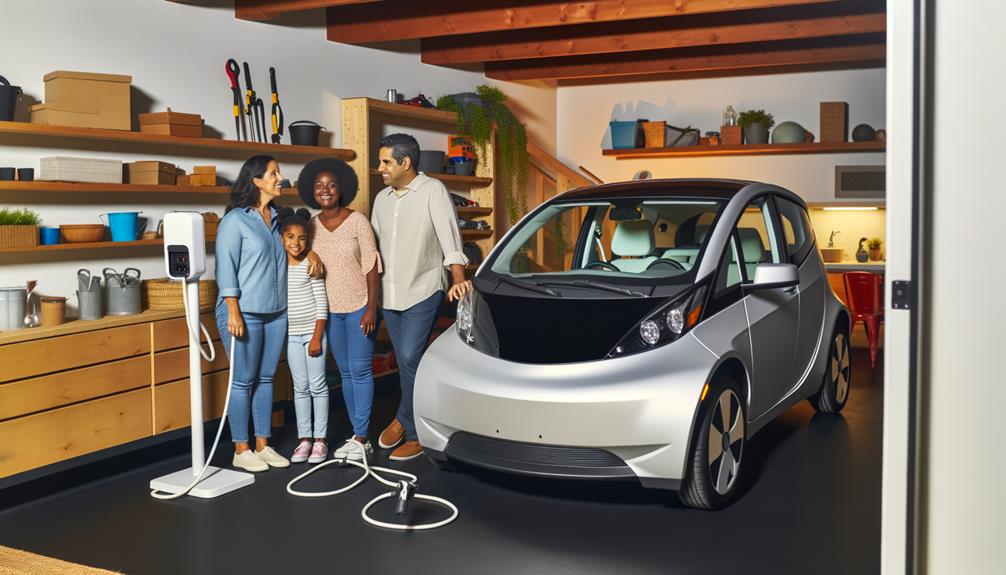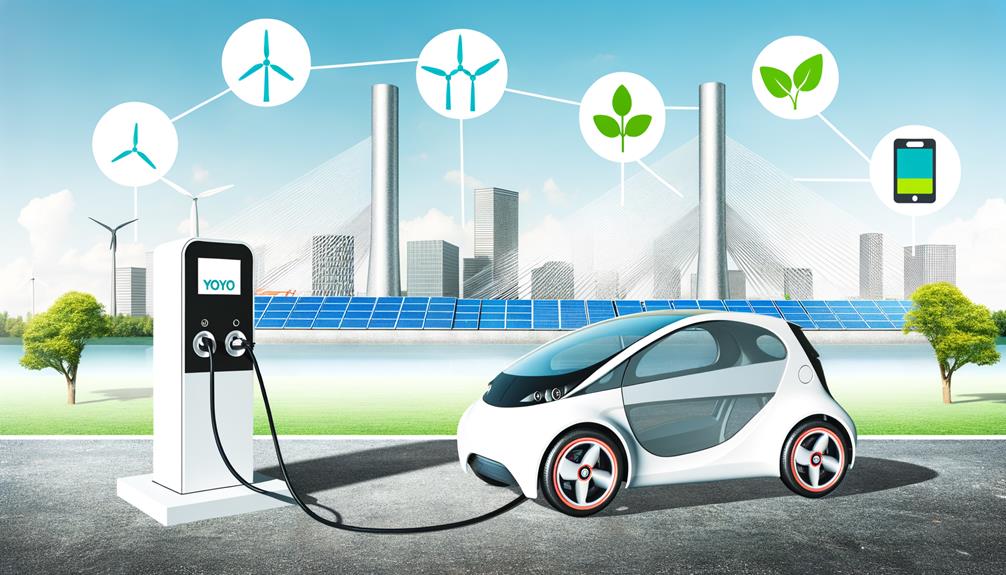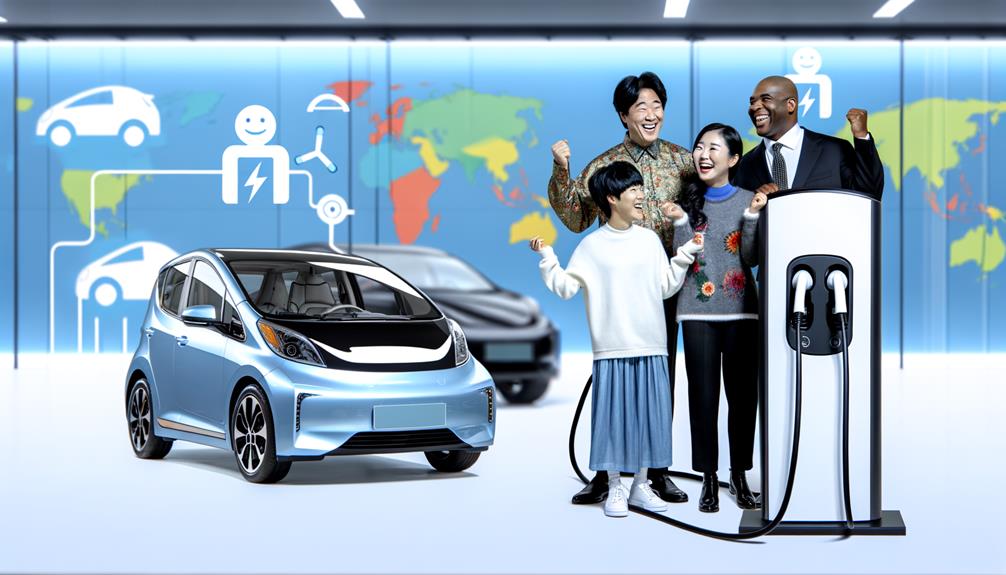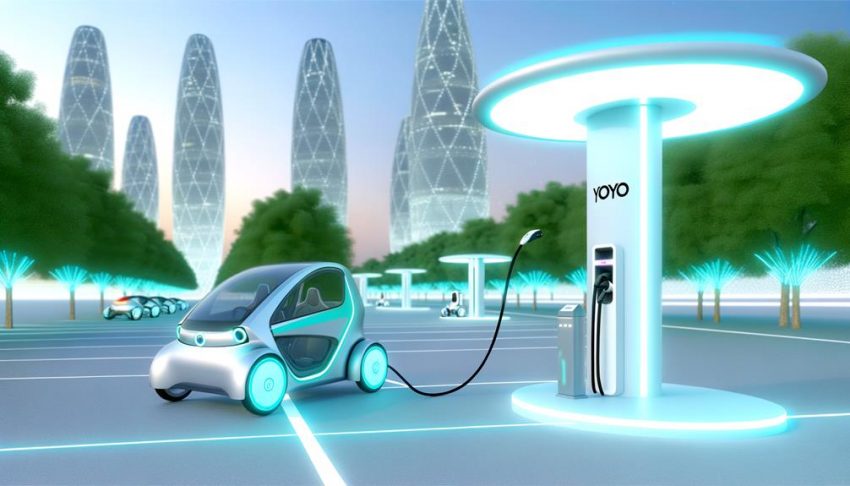You're probably wondering if your Yoyo Electric Car needs a special charging station. While it can be charged using a standard home outlet, this isn't always the most efficient option. For quicker charging times, a dedicated Level 2 charger is recommended, reducing the wait from 8-10 hours to just 3-5. But is this added convenience worth the investment? And what about the benefits of public charging stations for longer trips? Understanding these factors could greatly impact your daily driving experience and long-term satisfaction. Let's explore what works best for you and your Yoyo.
Contents
Overview of Yoyo Electric Car
When considering urban commuting, the Yoyo electric car stands out due to its lightweight design, clocking in at just 460 pounds. This compact vehicle is tailored for city driving, making it a practical choice for maneuvering congested streets and tight parking spaces. Despite its small size, the Yoyo offers a top speed of just over 60 KPH, ideal for short-range travel within urban environments.
The Yoyo's power source is a lithium-ion battery system, which provides a swappable 10 kWh battery option. This feature not only extends the vehicle's operational flexibility but also reduces downtime associated with recharging. Speaking of recharging, the Yoyo is equipped with versatile charging options, including both standard AC and DC fast charging. This means you're not limited to a special charging station, allowing for greater convenience and flexibility in maintaining your vehicle's power levels.
One of the standout features is its range—up to 150 kilometers on a single charge. This makes it perfect for daily commuting and short-distance travel without frequent stops for recharging. Whether you're heading to work, running errands, or making quick trips around the city, the Yoyo guarantees you have enough range to get the job done.
In terms of charging infrastructure, the Yoyo's compatibility with standard charging stations means you can easily find places to recharge. This eliminates the need for specialized charging setups, making it more accessible for urban drivers. Consequently, you'll find the Yoyo electric car not only meets but exceeds the basic requirements for efficient and convenient urban commuting.
Charging Requirements
To charge your Yoyo electric car, you can use standard home electrical outlets, but for quicker charging, a dedicated home charging station is advisable. While a regular outlet (Level 1) takes about 8-10 hours, a Level 2 charger considerably cuts this time to 3-5 hours. For high-mileage use, public charging stations offer additional flexibility and efficiency, ensuring you have multiple options to suit your needs.
Home Charging Options
Your home's electrical setup plays an essential role in determining the efficiency and convenience of charging your Yoyo electric car. While the car can be charged using standard home electrical outlets, the benefits of dedicated home charging stations are worth considering. These specialized stations can dramatically enhance charging efficiency and reduce the time required to achieve a full charge.
Here are the primary home charging options for your Yoyo electric car:
- Level 1 Charging: This method uses a standard 120V wall outlet. It's straightforward but can take 8-10 hours for a complete charge. It's ideal if you have plenty of time to charge overnight.
- Level 2 Charging: Utilizing a 240V outlet, a Level 2 charging station can cut down charging time to 3-5 hours. Installation of a dedicated charging station requires an electrician but offers substantial long-term benefits regarding efficiency and convenience.
- Dedicated Home Charging Station: Installing a dedicated charging station in your home not only optimizes charging speed but also provides a reliable and convenient way to keep your Yoyo electric car ready for use.
Public Charging Stations
While home charging options provide convenience and efficiency, understanding public charging stations is vital for those who frequently travel long distances. Public charging stations play an essential role in the electric vehicle ecosystem, offering varied options to suit different needs. For your Yoyo electric car, you'll find that it's compatible with most public chargers, eliminating the need for special adapters.
Let's break down the charging levels. Level 1 chargers are the most basic, using a standard 120V outlet and taking 8-10 hours for a full charge. They're ideal for overnight charging but may not be practical on the go. For faster charging, Level 2 chargers use a 240V outlet and cut the charging time to 3-5 hours, making them suitable for public spaces like shopping centers and workplaces.
For the fastest charging, DC Fast Charging stations are your best bet. They can recharge your Yoyo in about 30-40 minutes, perfect for quick top-ups during long trips. These stations are strategically located along major highways and in urban centers, guaranteeing you can maintain peak battery levels without significant downtime. Understanding these options guarantees you're never left stranded and can make the most of your Yoyo's capabilities.
Dedicated Charging Benefits
Dedicated home charging stations offer numerous benefits that can greatly enhance the overall experience of owning a Yoyo electric car. While you can charge your Yoyo using standard home electrical outlets, investing in a dedicated Level 2 charger can markedly improve your vehicle's charging efficiency and convenience.
Key Benefits of Dedicated Charging Stations:
- Enhanced Charging Speed: A Level 2 charger, which operates on a 240V outlet, can charge your Yoyo in approximately 3-5 hours. This is a substantial improvement over standard outlets, which can take much longer. Faster charging means your car is ready to go when you are, improving your daily convenience.
- Increased Efficiency: Dedicated charging stations are designed to optimize the charging process. They often include features like smart charging, which can adjust the power delivery based on your car's needs, thereby maximizing the efficiency and lifespan of your battery.
- Convenience and Reliability: Having a dedicated home charging station means you don't have to rely on public charging infrastructure, which can vary in availability and charging speed. You can charge your car overnight or whenever it's most convenient for you, ensuring it's always ready for your next journey.
Home Charging Options

Charging your Yoyo electric car at home presents a range of convenient options tailored to fit different needs and schedules. The most accessible method is through standard home electrical outlets, also known as Level 1 chargers. These utilize the existing infrastructure in your home, allowing you to charge your vehicle without any additional installations. However, it is essential to recognize that Level 1 charging typically takes around 8-10 hours to fully charge the Yoyo, making it a suitable option for overnight charging.
For those seeking enhanced charging speed, installing a dedicated home charging station is a viable option. These Level 2 chargers greatly reduce the time required to fully charge your vehicle to approximately 3-5 hours. The installation involves a higher voltage outlet, usually 240 volts, similar to those used by large home appliances. This setup not only shortens charging times but also improves the overall efficiency and user experience.
The convenience of home charging stations cannot be overstated. They offer the flexibility to charge your car overnight, ensuring it's ready for daily use without the hassle of finding public charging stations. Additionally, installing a Level 2 charger at home can increase the resale value of your property, as more buyers are looking for homes equipped to support electric vehicles.
True charging installations provide a seamless and efficient charging experience, enabling Yoyo owners to integrate electric vehicle usage into their daily routines effortlessly. Whether you opt for the straightforward Level 1 charging through a standard outlet or the faster, more efficient Level 2 home charging station, the options available can meet various needs and preferences, ensuring your Yoyo is always ready to go.
Public Charging Stations
When you're charging your Yoyo electric car at public stations, you'll find that compatibility with CCS connectors simplifies the process, eliminating the need for additional adapters. Be aware that charging speed can vary greatly across providers like ChargePoint and EVgo, so researching local options is vital for best performance. Additionally, access to municipal stations could offer economical benefits, but availability may fluctuate, making it essential to plan your charging stops accordingly.
Charging Network Compatibility
Most public charging stations are seamlessly compatible with the Yoyo electric car, thanks to its use of the widely adopted CCS connector. This compatibility guarantees that you don't need any special adapters, making it straightforward to access a variety of charging networks. Let's examine the charging network compatibility in detail:
- Major Networks: The Yoyo car can efficiently utilize major networks like ChargePoint and EVgo, which support DC fast charging. This allows for rapid recharges, especially useful when you're on the go and need a quick top-up.
- Tesla Supercharger Access: Although Yoyo isn't natively compatible with Tesla Superchargers, certain third-party adapters enable this functionality. This broadens your charging options remarkably, giving you access to one of the most extensive and reliable charging networks.
- Municipal Stations: Many municipal charging stations offer free or discounted rates, making urban travel more economical. These stations typically support the CCS connector, guaranteeing that your Yoyo car can easily recharge while you're out and about in the city.
Understanding these aspects of charging network compatibility guarantees that you can plan your routes effectively, taking advantage of various public charging options without worrying about needing special equipment.
Charging Speed Variability
Typically, the charging speed of public stations can vary greatly, impacting your overall experience with the Yoyo electric car. The Yoyo electric car is compatible with public charging stations equipped with CCS connectors, so you won't need any adapters. However, the variability in charging speeds can considerably affect how long you're waiting for your vehicle to charge.
Level 1 chargers, which are the slowest, can take 8-10 hours to fully charge your Yoyo. These are generally not ideal if you're on the go. Level 2 chargers offer a more practical solution, reducing charging time to around 3-5 hours, making them suitable for daily use if you're not in a rush.
For the most efficient charging experience, DC fast charging stations are your best bet. These stations can recharge your Yoyo electric car in as little as 30-40 minutes, which is particularly advantageous for high-mileage users. Networks like ChargePoint and EVgo support DC fast charging, adding to their convenience.
However, the variability in availability and speed at these public charging stations can pose challenges, impacting your overall charging experience. As a result, understanding these differences is vital to optimizing your Yoyo electric car's charging efficiency.
Access and Availability
While charging speed variability is a notable factor, the accessibility and availability of public charging stations also play a critical role in your overall experience with the Yoyo electric car. Fortunately, the Yoyo electric car is compatible with most public charging stations without needing special adapters, thanks to its CCS connector. This compatibility guarantees you can charge at widely available networks like ChargePoint and EVgo, which support DC fast charging and are ideal for high-mileage drivers.
To make your charging experience seamless and economical, consider these key points:
- Municipal Charging Stations: Many urban areas offer free or discounted charging options at municipal stations, making it cost-effective for daily commuting.
- Tesla Superchargers: With third-party adapters, the Yoyo can access Tesla Superchargers, expanding your charging choices considerably.
- Provider Variability: Availability and charging speed can differ by provider, so it's vital to plan your route and charging stops accordingly to avoid delays.
Understanding these aspects can help you navigate the landscape of public charging stations more efficiently, guaranteeing your Yoyo electric car remains powered for all your journeys.
Benefits of Dedicated Stations

Investing in a dedicated charging station for your Yoyo electric car offers numerous benefits, fundamentally transforming your charging experience. One of the most significant advantages is speed. With a dedicated Level 2 charger, you can reduce your Yoyo's charging time from the 8-10 hours required by standard outlets to just 3-5 hours. This accelerated charging process guarantees your vehicle is ready when you need it, minimizing downtime and maximizing efficiency.
Moreover, having a dedicated home charging station provides enhanced convenience and reliability. Unlike public charging stations, a home setup assures consistent access to power, guaranteeing your Yoyo is always charged and ready for daily use. This reliability means you won't have to worry about the availability of public charging points, especially during peak times or in less accessible locations.
Safety is another critical benefit. Modern charging stations are equipped with advanced safety features that protect against overcharging and electrical faults. These features not only safeguard your vehicle's battery but also enhance overall user safety, giving you peace of mind during every charging session.
From a long-term perspective, the initial investment in a dedicated charging station is offset by the ongoing convenience it provides. Once installed, the station becomes an integral part of your daily routine, eliminating the need for repeated infrastructure investments.
Additionally, utilizing a dedicated charging station allows for smart charging options. You can program the station to charge during off-peak hours, potentially lowering your electricity costs and contributing to a more sustainable energy consumption pattern.
Charging Time Comparison
Understanding the varying charging times for your Yoyo electric car is essential for optimizing your vehicle's performance and convenience. The XEV Yoyo offers multiple charging options, each with distinct charging times that can impact your daily schedule and long-term use.
1. Level 1 Charging (Standard Home Outlet):
Charging your XEV Yoyo using a standard home electrical outlet, also known as Level 1 charging, is the most accessible method. It does not require any special charging station. However, the charging time is relatively long, taking approximately 8-10 hours for a full charge. This method is ideal for overnight charging when you're not in a rush.
2. Level 2 Charging (240V Outlet):
For a faster and more efficient charging experience, a Level 2 charger, which uses a 240V outlet, can considerably reduce the charging time to about 3-5 hours. This option may require the installation of a dedicated charging station at your home or access to public Level 2 chargers. It's perfect for those who need a quicker turnaround, such as during work hours or mid-day breaks.
3. DC Fast Charging:
If speed is your primary concern, DC Fast Charging stations offer the quickest solution. These stations can charge the XEV Yoyo in approximately 30-40 minutes. While custom installations for fast charging aren't necessary, they can provide unparalleled convenience, especially during long trips or when you need a rapid recharge.
User Experiences and Feedback

Over the past few months, user experiences with the Yoyo electric car's charging capabilities have provided valuable insights into its practicality and efficiency. You'll be pleased to know that many users have reported that the Yoyo can be charged using standard home electrical outlets, making it incredibly convenient for everyday use. This eliminates the need for a special charging station, which is a noteworthy advantage for those looking to avoid additional costs.
However, it's essential to mention that while standard outlets can handle basic charging, dedicated home charging stations greatly enhance both the speed and convenience of the process. Users who have installed these stations in their homes report much quicker charging times, which is particularly beneficial if you're frequently driving at the car's top speed and find yourself needing to recharge more often.
Flexibility is another key highlight. Many Yoyo owners appreciate having multiple charging options, including access to public chargers, which is indispensable for high-mileage usage. This adaptability guarantees that you're not tied down to a single charging method, making long-distance travel more feasible.
Despite these advantages, some users have expressed a desire for more thorough information on the various charging options available. This indicates a need for better knowledge sharing within the Yoyo community, perhaps through detailed guides or user forums.
Frequently Asked Questions
Do You Have to Install a Special Charger for an Electric Car?
You don't have to install a special charger for an electric car. However, for ideal charger compatibility and faster charging times, a dedicated home charging station (Level 2) is recommended, though standard electrical outlets (Level 1) will suffice.
Can an Electric Car Use Any Charging Station?
Yes, your electric car can use any charging station with universal compatibility if it uses the CCS connector. However, you'll find varying charging speeds: Level 1 is slow, while Level 2 and DC fast chargers are faster.
Do You Need a Special Charging Point for an Electric Car?
You don't need a special charging point for an electric car. Charging compatibility guarantees you can use standard home outlets or public stations. However, dedicated home stations offer faster, more convenient charging, especially for daily use or high-mileage needs.
Do You Need a Special Power Point to Charge an Electric Car?
You don't need a special power point for home charging an electric car. A standard home outlet works fine, but it's slower. For faster home charging, consider installing a dedicated 240V outlet to greatly reduce charging time.
Conclusion
To sum up, while your Yoyo Electric Car doesn't need a special charging station, investing in a Level 2 charger optimizes performance and greatly cuts down charging time from 8-10 hours to just 3-5 hours. Utilizing public charging stations can further enhance your vehicle's flexibility for long-distance travel. Users generally find that dedicated stations offer a more efficient and convenient charging experience, making them a worthwhile consideration for daily use and extended trips.
